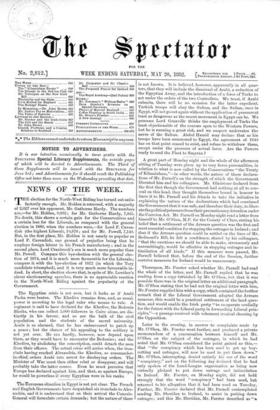A great part of Monday night and the whole of
the afternoon sitting of Tuesday were given up to very fierce personalities, in relation to what is now called by the Conservatives " the Treaty of Kilmainham,"—in other words, the nature of those declara- tions of Mr. Parnell's on the strength of which the Government liberated him and his colleagues. Mr. Gladstone declared from the first that though the Government had nothing at all to con- ceal on this head, they thought themselves bound in honour to leave it to Mr. Parnell and his friends to take the initiative in explaining the nature of the declarations which had convinced the Government that it was safe, and therefore their duty, to liber- ate the political prisoners from their precautionary detention under the Coercion Act. Mr. Parnell on Monday night read a letter from himself to Mr. O'Shea, M.P. for the County of Clare, stating his belief that a settlement of the Arrears question was the first and most essential condition for stopping the outrages in Ireland ; and that if the Arrears question could be settled on the lines of Mr. Redmond's Bill, he felt a confidence, shared by his colleagues, "that the exertions we should be able to make, strenuously and unremittingly, would be effective in stopping outrages and in- timidation of all kinds." If this measure were passed, Mr. Parnell believed that, before the end of the Session, further coercive measures for Ireland would be unnecessary.
































